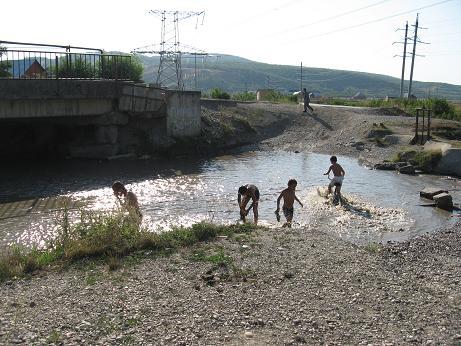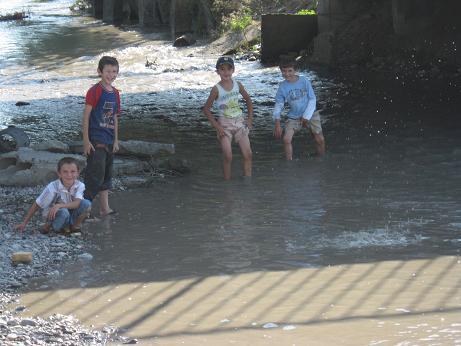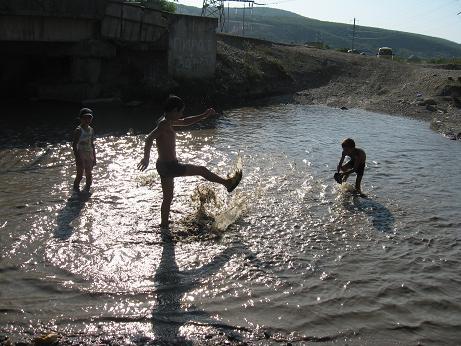Chechen children's summer holidaysBy Ruslan Isayev
CHECHNYA – The free time Chechen children have during the summer holidays doesn’t differ much from the free time enjoyed by their peers in other regions of Russia. The only real difference is a lack of choice in the matter of how to spend the three months of vacation. Given that most adult Chechens see vacations as an empty pastime and consider that they should be used for material gain, many children stay at home and help their parents at home or take jobs on construction sites.
The most widespread form of activity Chechen children engage in during their holidays, if such they can be called, is swimming in the republic’s many rivers and reservoirs. Crowds of country children, taking with them nothing but bread, go off in the early morning to the river on the outskirts of the village. Feeding on the wild apples that grow in abundance on abandoned plots of land, the boys spend entire days there. Over the summer they usually acquire such a deep tan that it doesn’t fade until the end of the autumn. Doctors have observed that that spending the holidays in this way strengthens their immune systems, thus excluding the possibility of colds and respiratory ailments in winter.
The Chechen authorities have made it possible for children to spend their holidays in other republics in the region. However, few parents let their offspring travel beyond Kabardino-Balkaria or neighbouring Dagestan. While in previous years quite a few families were willing to send their children there, this year it’s a rare occurrence, even though the teachers assure them that the children will be guarded, and that all will be well. The reason for this is the unstable situation in the North Caucasus and the increasingly frequent clashes of Chechen children with local kids.
The most recent dispute of this kind, which eventually grew into a fight in which knives were used, and resulted in several Chechen teenagers being injured, occurred a month ago in Kabardino-Balkaria. Only the prompt intervention of the authorities of the two republics put a stop to this ethnically-based incident. Last week something similar happened in Dagestan. A Chechen involved in a dispute stabbed a local resident. That same evening, fearing retribution, nearly all the Chechen families who were holidaying in the city concerned left Dagestan.
The way in which children of well-off parents spend their holidays reflects their families’ social status. At their disposal they have the federal holiday camps in Krasnodarsky Krai. But this applies only to those who have the means to send their offspring there – excluding the children of Chechen government officials: they are tacitly forbidden to send their children to places that less well-off families can't afford.
When one takes into account the fact that the less well-off constitute more than half the republic’s population, not nearly as many people send their children away on holiday as was the case in Soviet times. In those days there were more than twenty pioneer camps in the Chechen-Ingush Autonomous Socialist Soviet Republic (ChIASSR), where children from other Soviet republics also spent their holidays. Now all the former camps that were located in some of the most picturesque parts of the Chechen foothills are in ruins, and there is so far no word about their future restoration.
It was a symbolic fact that in the short interlude between the wars a former children's camp near the village of Serzhen-Yurt became the site of a military training centre run by the Arab field commander Khattab. The charge of having attended that training program is frequently used against Chechens being held in detention if the authorities don’t have sufficient evidence against them on any other count.
The children who remain in Chechnya work alongside their parents, helping them with the harvest or with construction projects. There is a current fashion for children to work at filling stations. Instead of making themselves scarce from morning till night, some of the children prefer to help drivers fuel their cars. Although these kids are not very useful – they merely open and close the tank, while the driver pays at the cash desk as before – they are well remunerated. Children who work really hard can earn as much as 500 or 600 roubles a day, which is quite comparable to the average wage on a building site.
13-year-old Anzor has never been to the seaside, and neither has his father Abdullah. He doesn’t even dream of it. For more than a month now, he has been helping his father build their own house. Anzor doesn’t mind that many of his peers spend whole days bathing in the river. "If I didn’t help my father, who would? If I go to the river today, I’ll still have to finish the work tomorrow. And I can go swimming in the evening,” Anzor reasons, like a grown-up.
Children are the flowers of life, it’s said, but in most cases Chechen children grow like flowers of the field, not as some special species of orchids or roses. Their young bodies make it possible for them to undertake the most useful tasks in all weathers, even though their growth is haphazard, and takes place in spite of the complex world of adults, which is so imperfect.
Translation by David McDuff.



(D/T) RELATED ARTICLES:
· War still affecting psychological condition of Chechnya's children (PW, 2.7.2007)
· Large numbers of street children discovered in Chechnya (23.3.2007)
DISCUSSION FORUM
|

